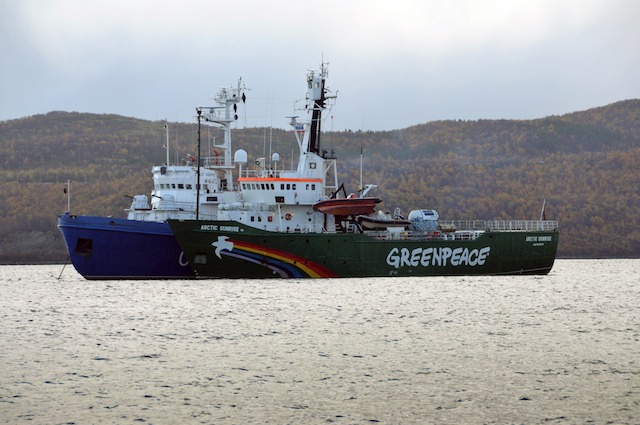SUMMARY
This is AI generated summarization, which may have errors. For context, always refer to the full article.

MOSCOW, Russia – Russia opened a criminal probe Tuesday, September 24 into suspected piracy by both foreign and local activists from environmental lobby group Greenpeace who staged a protest at sea over Arctic oil exploration by energy giant Gazprom.
Four Russians and 26 foreign nationals – all of them interrogated Tuesday aboard a Greenpeace icebreaker seized by the Russian authorities last week – could face up to 15 years in jail if the case comes to trial.
On Tuesday evening the team was told to pack up and get ready to move onshore, a Greenpeace spokeswoman said.
Maria Favorskaya told Agence France-Presse the group expected the activists to be taken to investigators in the city of Murmansk, in Russia’s far north.
The group had been trying to highlight the dangers of Russian-led efforts to develop the Arctic as ice floes break up due to global warming.
It sent a team of inflatable boats to the Gazprom platform in the Barents Sea on September 18 from the Arctic Sunrise icebreaker and hitched two activists to the side of the rig. The pair tried to scale the platform but eventually slipped into the freezing water and were recovered by the Russian coastguard.
Agents from Russia’s Federal Security Service (FSB) seized control of the activists’ vessel the next day by descending onto the deck from helicopters in a commando-style raid.
The Dutch-flagged ship was anchored earlier Tuesday off the coast of Murmansk after being towed from the scene of the incident by Russian border guards, in a voyage lasting several days.
It remained unclear whether all 30 members of the crew who were monitoring Gazprom’s activities would be prosecuted or just the two who were directly involved in the climbing stunt.
The chief spokesman for the powerful Investigative Committee – Russia’s equivalent to the FBI – said regional security authorities had launched a criminal probe for piracy “undertaken by an organized group”.
Investigative Committee spokesman Vladimir Markin warned that the activists would be prosecuted regardless of their citizenship.
“It should be noted that all persons who attacked the (oil) platform, regardless of their citizenship, will be brought to criminal responsibility,” he said.
‘We will not be intimidated’
Greenpeace has condemned Russia’s actions and said its supporters had already sent more than 415,000 emails and letters of support for the “Arctic 30” to Moscow’s embassies around the world.
“Any charge of piracy against peaceful activists has no merit in international law,” Greenpeace’s international executive director Kumi Naidoo said in an emailed statement.
“We will not be intimidated or silenced by these absurd accusations and demand the immediate release of our activists.”
Russia’s slice of the Arctic is generating growing interest from energy producers as gradually rising temperatures open sea lanes and start to reveal the vast oil and natural gas reserves thought to be buried below.
But Greenpeace argues that the firms have no plan in place to deal with potential oil spills in a previously unexplored environment that is home to polar bears, walruses and rare seabirds.
The icebreaker had been monitoring the exploration activities of Gazprom and state oil firm Rosneft for most of the past two months to expose the hazards facing the nature reserve.
Its presence until Tuesday had been barely noted by Russia’s state-run media that dominate the airwaves – a signal that the issue may be either sensitive or unpleasant for the Kremlin.
President Vladimir Putin has been facing dual threats from a fledgling opposition movement and an economic slowdown whose pace has been largely tempered by Russia’s oil and gas exports.
Putin has over the past few years welcomed some of the West’s largest energy companies to the Arctic, and the authorities’ muscular response to the latest Greenpeace action seems to indicate their resolve.
Greenpeace says the Russian action was illegal because the Arctic Sunrise was in international waters at the time of the raid.
But Markin argued that the ship was “in the exclusive economic zone of the Russian Federation” when it was boarded by the FSB agents.
Russia’s legal system requires the authorities to open a formal investigation under a specific statute of the criminal code before filing any specific charges against individuals or groups. – Rappler.com
Add a comment
How does this make you feel?
There are no comments yet. Add your comment to start the conversation.